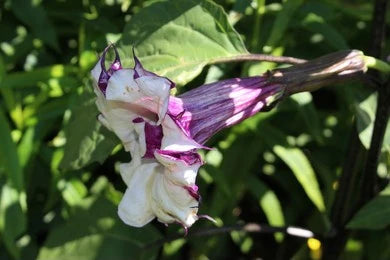The annual herb known as Dhattura (Datura metel) is large, upright, and robust and can reach heights of up to 3 feet. It has dark violet branches with oblong to broad oval leaves that are frequently dark violet and are rather hairy.
Simple, broad to oval-shaped, and frequently dark violet in color, leaves are arranged alternately. This plant produces enormous, fragrant, bisexual, hypogenous flowers that are greenish white or can also be yellow, red, or violet in color. Its seed capsule is coated in many spines and several tapering humps.
The roots have lateral branches and are cylindrical in shape. Due to the presence of fissures, it has a rough surface and a brown tint. This plant's stem is hollow, green, and herbaceous with a potent odor.
Fruits are not spiky; they are knobby. The capsule is oblong to obovate, about 4 cm long, 3 cm wide, and covered in short, sharp spines. It has a harsh, caustic flavor. Axillary and solitary inflorescence are both present.
General Description
Despite being a poisonous plant, dhattura, also known as thorn apple, is employed in many Ayurvedic treatments after being purified. The Dhattura plant's blooms are anti-asthmatic, while its leaves are anticancer, anti-rheumatic, and anti-inflammatory. The root, seeds, and leaves have properties that are anti-diarrheal, anti-catarrhal, febrifuge, and anti-dermatosis.
Scopolamine, Daturadiol, Hyoscyamine, Fastudine, Allantoin, Niacin, Vitamin C, Noratropine, Atropine, Meteolodine, Hyosine, Fastusic Acid, etc. are some of its chemical components.
Classification
Botanical Name: Datura metel
Kingdom: Plantae
Division: Magnoliophyta
Class: Magnoliopsida
Order: Solanales
Family: Solanaceae
Genus: Datura
Species: Metel
Habitat
Datura metel is frequently found in tropical and temperate regions of the Himalayas and India. Additionally discovered on roadsides and other fallow ground all around Bangladesh. In some areas of Kenya, Tanzania, and Uganda, it is invasive. In fertile calcareous soil, it grows quite well.
Other Names
Sanskrit Name - Dhuttura Kanaka, Kanakahvya
Hindi Name - Sada Dhattura
English Name - Devil's trumpet, Metel, Thorn apple
Telugu Name - Ummetta
Tamil Name - Ummattangani/Vella-Ummathai
Bengal Name - Dhattura
Gujarati, Marathi Name - Dhattura
Urdu Name - Dhattura
Kannada, Malayalam Name - Unmatta, Dhattura
Arabian Name - Datur
Farsi Name - Tatur
Ayurvedic Properties
|
Particular |
Hindi / Sanskrit |
English |
|
Rasa (Taste) |
Laghu, Rooksha |
Light, Dry |
|
Guna (Physical Property) |
Tikta, Katu |
Bitter, Pungent |
|
Virya (Potency) |
Ushna |
Hot |
|
Vipaka (Post-Digestive Taste) |
Katu |
Pungent |
Effects on Doshas
It is useful to balance Kapha and Vata Dosha.
Classical Categorization
Upavisha Varga - A category of herbs that have negative health consequences on the body
Practical Uses
Narcotic, caustic, anodyne, antispasmodic, intoxicating, emetic, sedative, and hypnotic qualities can be found in dhattura.
- It is an effective CNS stimulant.
- Additionally, it has been reported to help with nausea, vertigo, and motion sickness.
- It contributes significantly to preoperative indication as well.
- It is a helpful herb if uterine stimulation is required.
- It is effective in treating arthritis and for easing aches.
- It may cause nausea.
- It might lessen headaches.
- In ophthalmic cases, this plant is helpful for dilating the pupil of the eye.
- Even the discomfort and swelling are lessened as a result.
- Its external application promotes quick wound healing.
- It is also a beneficial herb for reducing fever.
- When used as a paste, it cleanses the skin and soothes itching.
- It is recommended that those with chronic respiratory conditions, asthma, and dysuria use purified Datura seed orally.
- The herb dhattura is helpful for anxiety disorders.
- It has advantages since it might lessen spasms.
- It may result in a small rise in blood pressure.
- In some countries, such as Java, seeds are chewed or inserted into cavities to relieve dental discomfort.
Part Used
Seeds
Flower
Root bark
Leaves
Dosage
Seed - 50 - 100 mg (After purifications)
Cautions
- The herb dhattura is extremely poisonous.
- Children, nursing mothers, and expectant moms should avoid it.
- Dhattura's toxic effects on the body include excessive thirst, dry mouth, and an increase in heart rate.
- Vision that is hazy with noticeable mydriasis, hallucinations, delirium, and loss of motor coordination, which may progress to a coma and eventually cause respiratory failure that results in death.
- For women who are expecting, nursing mothers, and kids, it is not advised.

